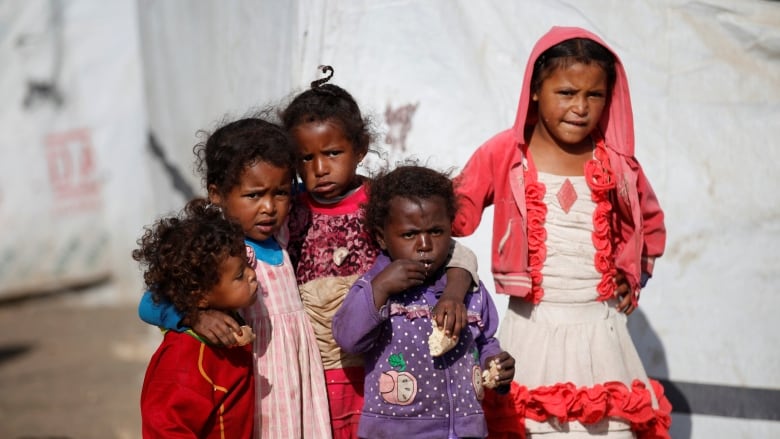
How do you raise children in Yemen during what the United Nations has dubbed “the largest humanitarian crisis in the world”?
“To be honest with you, I have to lie a lot,” Hisham Al-Omeisy, a political analyst and father of two in the Yemeni capital of Sanaa, told As It Happens host Carol Off.
“They see some blood, and I know that people are dead, but I have to tell them, ‘No, no, no, it’s just an injury, don’t worry, he’s gonna be OK.’
“Whenever a bomb happens, I rush them to the basement, I open some music, I give them my cellphone and open some Disney videos on them, trying to keep them distracted and busy.”
Al-Omeisy’s children are among the lucky few who have a basement to hide in and parents privileged enough to shelter them from the harsh realities of everyday life.
According to the UN, a child dies every 10 minutes in Yemen. Others, still, have taken up arms themselves.

The country’s civil war — which pits a Western-backed coalition of mostly Arab Sunni countries against the Shia rebels known as Houthis — has killed more than 10,000 civilians and pushed the Arab world’s poorest nation to the brink of famine.
Nearly 2.2 million children are malnourished, including half a million who are severely malnourished and at imminent risk of death if they do not receive urgent care and specialized treatment, UNICEF and WFP said in a statement released Tuesday.
So when international donors pledged $1.1 billion in aid to Yemen at a UN conference in Geneva on Tuesday, that was cold comfort for Al-Omeisy.
UN pledge too little, too late
Just a little over half of the $2.1 billion US funding sought at the conference was raised as of Tuesday afternoon. Even if they reach their goal, the funds would fall short of helping the estimated 18.8 million who need urgent assistance.
What’s more, there’s no guarantee any aid pledged will actually get past the Saudi-led external blockades or the Houthi internal sieges.

“It’s a disaster. Yemenis do not want more aid. They want the UN to address the root causes that are basically causing the humanitarian crisis,” Al-Omeisy said.
“If you do not address the root causes, there’s no point in the aid and no amount is going to be sufficient and we’re basically begging people to give us money that is not forthcoming.”
What’s needed, Al-Omeisy says, is a real commitment to negotiating peace in the region — something he doesn’t believe Western nations are interested in doing so long as there’s a buck to be made.